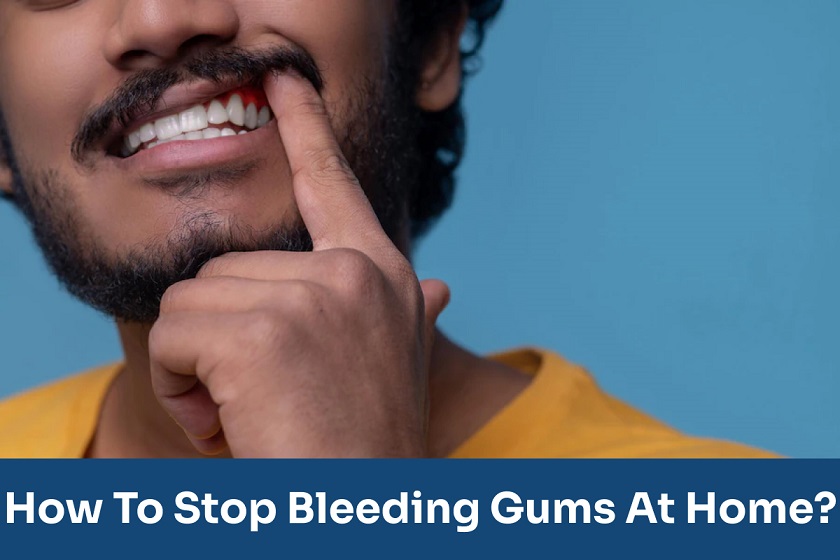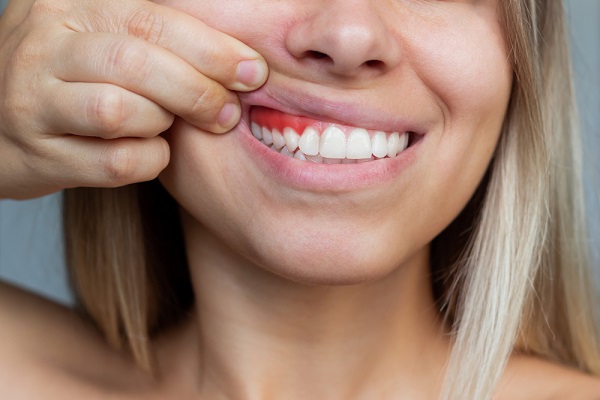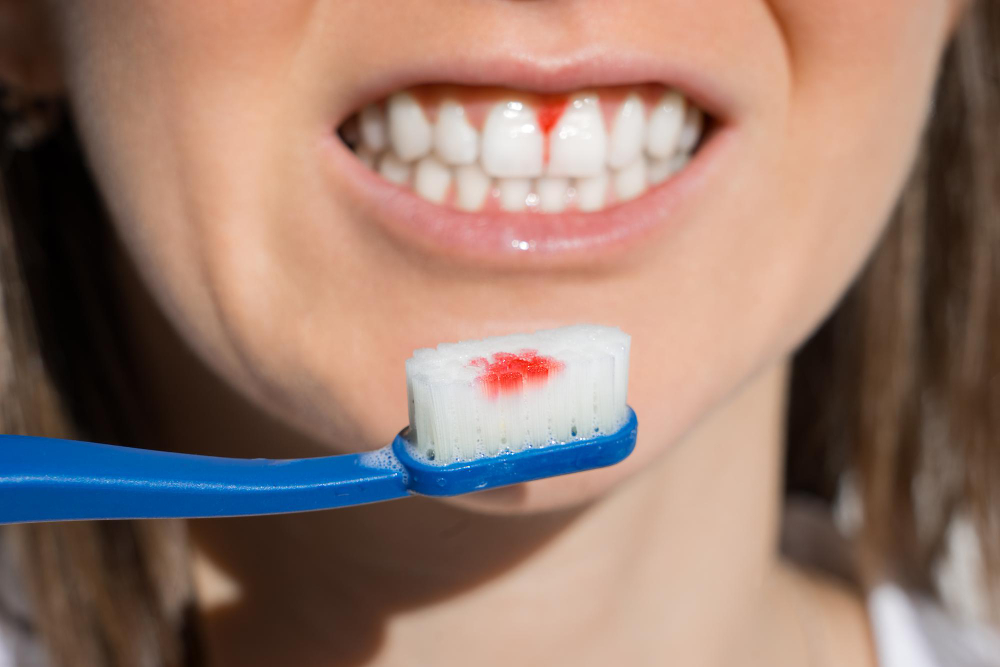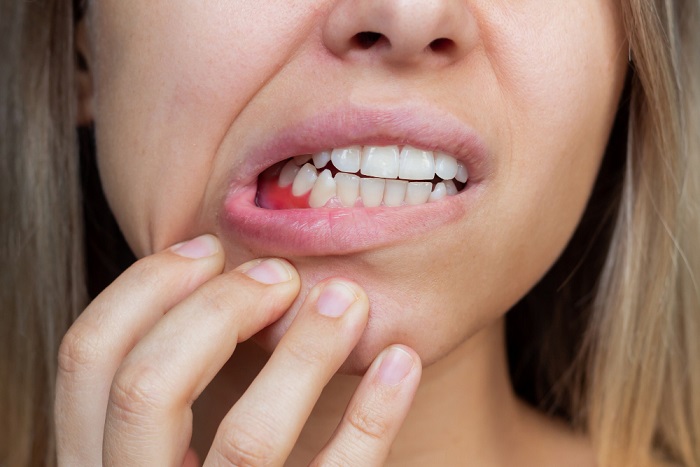

Everyone has had the experience of tasting blood in their mouth. No, this isn’t a post for vampires. It’s for all of you who have ever rinsed your mouth after brushing your teeth and been horrified at flecks of blood in the bowl. Sound familiar? You should not be surprised to know your oral type is that of a bleeding mouth. So what does having a bleeding mouth mean? Should you be worried? Let’s find out.
Your gums look more red than normal, swollen, and puffy. Gums present in the spaces between your teeth appear bulky. This is because your gums are inflamed due to slight irritation from the plaque and calculus buildup on the surfaces of your teeth. This makes the gums sensitive and bleeds even while performing activities like brushing, chewing, or even with the slightest touch or pressure.
The intensity of bleeding gums depends on the degree of gum inflammation. The intensity of bleeding gums is less in mild cases of gum diseases ( gingivitis) and more in advanced cases (periodontitis).
Bleeding gums are common. Here are some reasons why that happens – and what you can do about it.

Brushing aggressively can tear the delicate gum tissues and cause them to bleed.
Hard bristles often cause tearing of gums and cause bleeding. Dentists do not recommend the use of hard bristle brushes.
This is the primary cause of bleeding gums. It all starts with plaque. Plaque accumulation on the surface of teeth irritates your gums and causes bleeding. The intensity of bleeding depends on how intense the inflammation in your gums is. Less intense cases are usually those of gingivitis, where there isn’t much tissue destruction. Intense cases like those in which bone loss is involved are more dangerous.
Flossing incorrectly can tear the gums between your teeth and cause bleeding.
Uncomfortable dentures and appliances keep causing gum irritations and tear the delicate gum tissue. Constant pricking from the appliances can also cause your gums to bleed.
Smoking or consuming tobacco in any form is very harmful to your mouth. Tobacco pieces or stains in your mouth lead to gum disease and bleeding gums very easily. Consumption of ‘paan’ or slaked lime can cause burns on the inside of your mouth, making your gums prone to inflammation and bleeding.
like Thrombocytopenia, Hemophilia etc.
In case of any previous heart attacks or heart surgeries etc
Pregnancy gingivitis. People experiencing hormonal surges like in menopause or puberty are more prone to bleeding gums. This is also true during pregnancy. Estrogen and progesterone can increase the blood flow to your gums. Always make sure to keep your mouth completely clean to avoid bleeding gums in these conditions.
Infection either in a tooth or the gum
Bleeding gums can be a sign of leukemia, a type of cancer. Your blood platelets help your body stop bleeding. If you have leukemia, your platelet count remains low. That makes it hard for bleeding to stop in different parts of your body and that also includes your gums.
This vitamin helps your tissue grow and repair. It heals wounds and strengthens your bones and teeth. Over time, you can also get swollen and bleeding gums.
This vitamin helps your blood clot properly. It's also good for your bones. dietary deficiency of vitamin K or inability of your body to absorb this vitamin can cause bleeding problems.
Bleeding gums as such are not inherited, but gum diseases are. So you actually may be prone to bleeding gums if it runs in your family.

Look for these signs and symptoms to know if you are suffering from bleeding gums—
Bleeding gums if not addressed in time can cause further damage to your gums.
Periodontitis (disease of gums spreading to the jaw bone)
Gum infections like gingivitis if not treated within time can reach advanced stages of gum infections that is periodontitis.
The gums start loosing attachment with the teeth in more advanced stages of periodontitis.
Once attachment is lost, the gums start to recede down and lose support to the teeth.
Once support to the teeth is lost, the teeth start becoming loose and become shaky.
all the above slowly and progressively cause damage to gums and bone that cannot be reversed.

Which diseases can aggravate if ignored (Dental & otherwise)
Choosing the right dental care products is very important to stop bleeding gums and improve the condition of your gums. Choosing any other dental products may not solve the issue of bleeding gums. Make sure your dental care kit contains —
A bleeding mouth is the first sign of gum infections like gingivitis and periodontitis. It is extremely important to keep your gums healthy to keep your teeth healthy. Choose the right dental products to cure bleeding gums (click here to know which dental products are right for you). To know the condition of your gums, you can simply take a self-scan of your mouth (on the scano.app) on your phone and also video consult a dentist to get a step by step guidance on your oral type— bleeding mouth.
Highlights -
Dr. Amrita Jain is a practicing dental surgeon since 4 years. She completed her B.D.S in 2016 and was has been a rank holder throughout her course. She suggests “Holistic dentistry is the best dentistry”. Her treatment line follows a conservative pattern which means saving a tooth is of utmost priority and preventing your teeth from getting decayed rather than curing it with a root canal treatment. She inculcates the same while consulting her patients.Apart from her interest in clinical practice, she has developed interest in research and writing over a period of time. She states “It is my clinical experience that motivates me to write and spread dental awareness”.Her articles are well researched with a combination of technical knowledge and clinical experience.
scanO is an AI ecosystem transforming oral health for patients, dentists, corporates, and insurers worldwide

© 2025 Trismus Healthcare Technologies Pvt Ltd